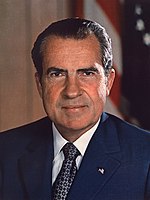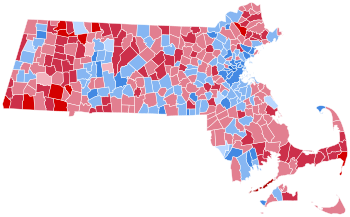| ||||||||||||||||||||||||||
| Turnout | 68.7%[1] | |||||||||||||||||||||||||
|---|---|---|---|---|---|---|---|---|---|---|---|---|---|---|---|---|---|---|---|---|---|---|---|---|---|---|
| ||||||||||||||||||||||||||
| ||||||||||||||||||||||||||
| ||||||||||||||||||||||||||
| Elections in Massachusetts |
|---|
 |
|
|
The 1972 United States presidential election in Massachusetts took place on November 7, 1972, as part of the 1972 United States presidential election, which was held throughout all 50 states and D.C. Voters chose 14 representatives, or electors to the Electoral College, who voted for president and vice president.
Massachusetts voted for the Democratic nominee, Senator George McGovern of South Dakota, over incumbent Republican President Richard Nixon of California. McGovern's running mate was U.S. Ambassador Sargent Shriver of Maryland, who had replaced Senator Thomas Eagleton during the campaign, while Nixon ran with incumbent Vice President Spiro Agnew of Maryland.
McGovern carried Massachusetts with 54.20% of the vote to Nixon's 45.23%, a Democratic victory margin of 8.97 percentage points (19.82% more votes than Nixon). In the midst of a massive nationwide Republican landslide in which Richard Nixon had carried 49 states, Massachusetts proved to be the only state in the nation that would cast its electoral votes for George McGovern, joined by the District of Columbia. McGovern also carried the state by a surprisingly comfortable nine-point margin, making the state 32% more Democratic than the national average in the 1972 election.
McGovern, a staunch liberal Democrat best known for his strong principled opposition to the Vietnam War, was painted by the Nixon campaign as an extremist too far to the left of the American mainstream at the time, and this paid off in delivering Nixon a nationwide re-election landslide. Prior to 1972, Massachusetts had been a Democratic-leaning state since 1928, and a Democratic stronghold since 1960. But McGovern's comfortable victory in 1972 still stands out, as many other traditional Democratic strongholds abandoned the Democrats in 1972. For example, Nixon took neighboring Rhode Island by six points, even though it normally voted similarly to Massachusetts. J. Anthony Lukas noted that many New Yorkers felt that Ted Kennedy's outsize money and influence in Massachusetts played a major role in keeping the state in the Democratic column, summing up this explanation simply as "Teddy did it". Kennedy was also the brother-in-law of Democratic vice presidential nominee Shriver.[2]
To date, this is the last time that the towns of Deerfield, Gill, Monterey, Oak Bluffs, Pelham, Tisbury, Williamsburg, and Williamstown have voted Republican.
- ^ REPORT NUMBER P20-253, Voting and Registration in the Election of November 1972, table 3
- ^ Lukas, J. Anthony (January 14, 1973). "As Massachusetts went—". The New York Times. ISSN 0362-4331. Retrieved May 17, 2019.




